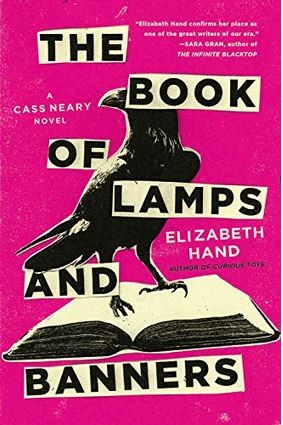Review of 'Book of Lamps and Banners' on 'Goodreads'
4 stars
CN: rape; CSA
This fourth book in Elizabeth Hand's Cass Neary series feels distinctly different than the others in the series. Whether that's down to the book itself or my own experiences and/or knowledge, I'm not entirely sure. I reread the first three novels in the series back-to-back before reading this one though and they have a certain dark mystique that this novel doesn't entirely replicate. If I can adopt, much less deftly than Hand herself does, the language of photography, the previous novels are a bit darker and out-of-focus while this one is better lit and sharper. I think that's partly due to the novel feeling more grounded in a specific time than the previous ones. Like in the previous novels, Hand does not explicitly give the year in which the story takes place and also does not use brand names. A cell phone is always a "mobile" and never an Android or iPhone. However, there are references to the recent public resurgence of various right-wing reactionary tendencies and the Charleston shooter is mentioned by name. These things, plus the references to an emerging virus, will make it clear to any reader with even a passing familiarity with current events that this novel likely takes place in early 2020. I suppose there are details in the previous novels that could situate those stories more distinctly in particular years, mentions of NYU land grabs, mentions of the speculation-driven economic downturn in Iceland, etc., but to me, the time in which this novel takes place is much more readily identified. It feels almost anachronistic for Cass Neary to have been conjured into a world that so closely resembles the one we're currently living in. On some level though, I think that is kind of the point of this novel. Cass Neary, having never dealt with the trauma in her past, has cut a jag through decades without ever even attempting to change with the times, and that leaves her unprepared to live in the world that now exists.
In the previous novels in the series, Cass's actions were certainly impulsive but there was also a sense of controlled chaos about her. Here though, Cass is less controlled chaos and more desperation. Cass is forced to fully acknowledge the trauma in her past and that drags her to the ragged edge of her ability to control her impulsive behavior. Cass's anger at herself for not trying to fight off the man who raped her impels her to fight to save Tindra Bergstrand from both the man who sexually abused her as a child and also from Tindra's own obsessive need to remove those traumatic memories from her mind. If like me you find Cass Neary deeply sympathetic in spite of her pattern of impulsivity and cultivated detachment (and if you've read this far in the series, I assume you do), then it is hard to witness Cass throwing herself with such abandon into this world of Swedish white nationalists and ancient mind-altering codes, even though her willingness to defy the law and sacrifice her own tenuous well-being is admirable on some level.
The other thing about this novel as compared to the previous entries in the series is that the ending feels less...apocalyptic. "Apocalyptic" is almost certainly not the exact word I am reaching for here, but I can't currently come up with a more fitting one. In any case, the final acts of each of the previous novels take place in settings that feel primordial: an abandoned island in rural Maine; the blasted, frozen outskirts of Iceland; and among the neolithic remains in rural Cornwall. Somehow, rural Swedish hideout of white nationalists does not conjure up that same air of age or isolation. I'm pretty sure though that this has less to do with Elizabeth Hand's ability to evoke that air (she has already proven that she is eminently capable of that task) than with the fact that in the last few years I have learned more about various types of nzis, Neo nzis, Neo confederates, European nationalists, white nationalists, and other assorted reactionary types than I ever thought I would want or need to.
While I didn't enjoy this fourth novel in the series quite as much as the previous three, Cass Neary is still one of my very favorite characters in crime fiction and I think it is appropriate that everything in Cass's past leads her to the events in this novel. If, as I suspect it might be, this is the final appearance of Cass Neary, I think this story is a fitting one to go out on.

